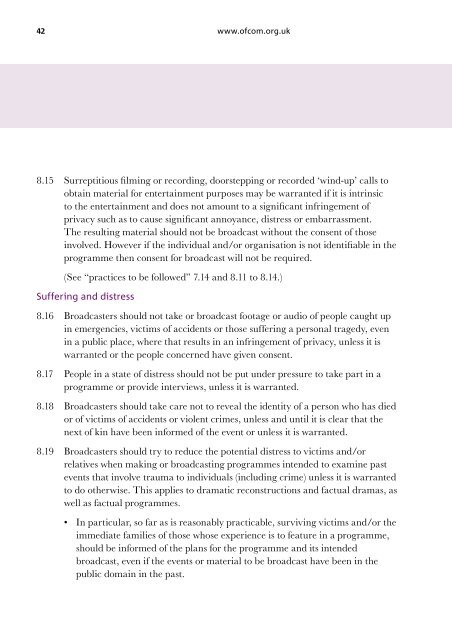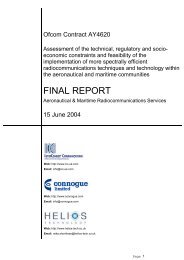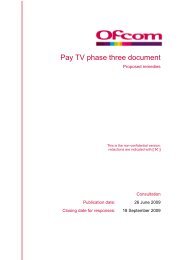THE OFCOM BROADCASTING CODE - Stakeholders
THE OFCOM BROADCASTING CODE - Stakeholders
THE OFCOM BROADCASTING CODE - Stakeholders
You also want an ePaper? Increase the reach of your titles
YUMPU automatically turns print PDFs into web optimized ePapers that Google loves.
42 www.ofcom.org.uk<br />
8.15 Surreptitious filming or recording, doorstepping or recorded ‘wind-up’ calls to<br />
obtain material for entertainment purposes may be warranted if it is intrinsic<br />
to the entertainment and does not amount to a significant infringement of<br />
privacy such as to cause significant annoyance, distress or embarrassment.<br />
The resulting material should not be broadcast without the consent of those<br />
involved. However if the individual and/or organisation is not identifiable in the<br />
programme then consent for broadcast will not be required.<br />
(See “practices to be followed” 7.14 and 8.11 to 8.14.)<br />
Suffering and distress<br />
8.16 Broadcasters should not take or broadcast footage or audio of people caught up<br />
in emergencies, victims of accidents or those suffering a personal tragedy, even<br />
in a public place, where that results in an infringement of privacy, unless it is<br />
warranted or the people concerned have given consent.<br />
8.17 People in a state of distress should not be put under pressure to take part in a<br />
programme or provide interviews, unless it is warranted.<br />
8.18 Broadcasters should take care not to reveal the identity of a person who has died<br />
or of victims of accidents or violent crimes, unless and until it is clear that the<br />
next of kin have been informed of the event or unless it is warranted.<br />
8.19 Broadcasters should try to reduce the potential distress to victims and/or<br />
relatives when making or broadcasting programmes intended to examine past<br />
events that involve trauma to individuals (including crime) unless it is warranted<br />
to do otherwise. This applies to dramatic reconstructions and factual dramas, as<br />
well as factual programmes.<br />
• In particular, so far as is reasonably practicable, surviving victims and/or the<br />
immediate families of those whose experience is to feature in a programme,<br />
should be informed of the plans for the programme and its intended<br />
broadcast, even if the events or material to be broadcast have been in the<br />
public domain in the past.
















